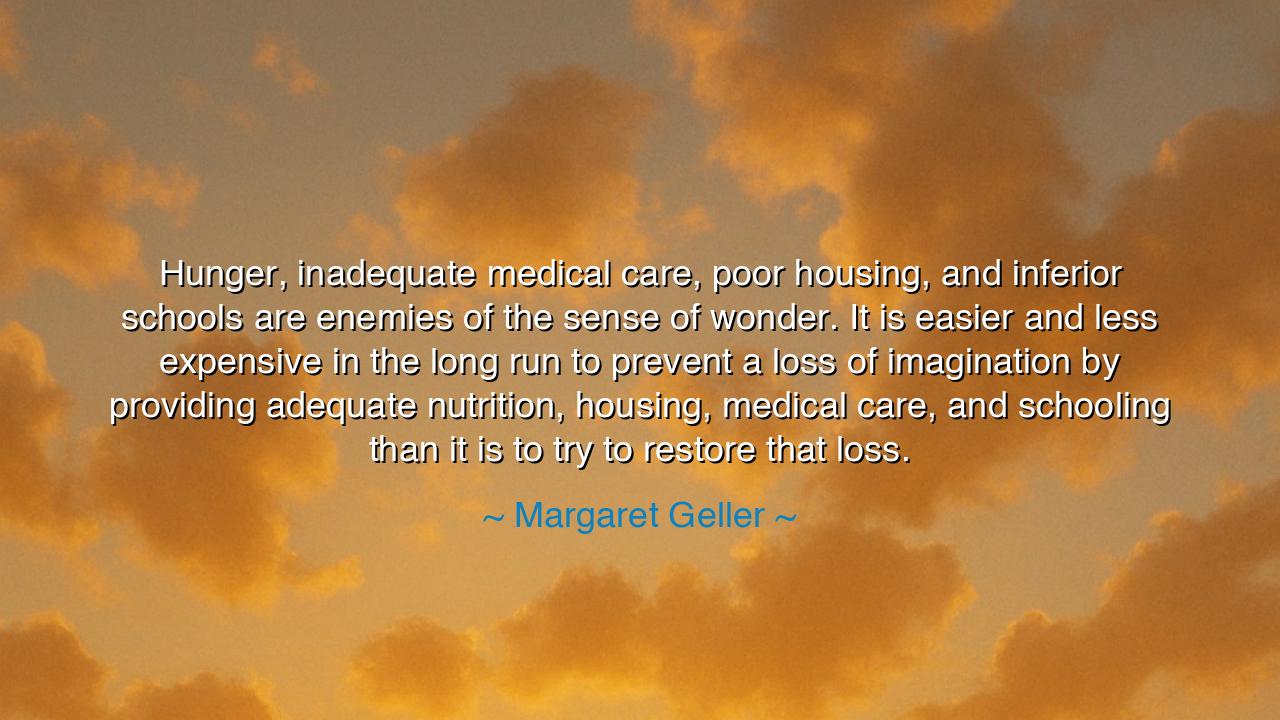
Hunger, inadequate medical care, poor housing, and inferior
Hunger, inadequate medical care, poor housing, and inferior schools are enemies of the sense of wonder. It is easier and less expensive in the long run to prevent a loss of imagination by providing adequate nutrition, housing, medical care, and schooling than it is to try to restore that loss.






When Margaret Geller wrote, “Hunger, inadequate medical care, poor housing, and inferior schools are enemies of the sense of wonder. It is easier and less expensive in the long run to prevent a loss of imagination by providing adequate nutrition, housing, medical care, and schooling than it is to try to restore that loss,” she was not merely describing a social truth — she was declaring a moral law of civilization. In her words, there burns the conviction that human potential is a sacred flame, easily dimmed when the body and spirit are starved of dignity. The quote is both a lament and a warning: that when a society neglects its people’s basic needs, it does not merely breed poverty — it extinguishes wonder, the divine spark of curiosity that drives learning, creativity, and discovery.
To Geller, a pioneering astrophysicist who spent her life mapping the vast architecture of galaxies, wonder was not a luxury but a necessity — the foundation of progress itself. She knew, as the ancients knew, that all great discovery begins in awe. A child who gazes at the stars and dreams of reaching them becomes the adult who builds ships to cross the void. Yet hunger, illness, and deprivation destroy that capacity for dreaming. When the stomach growls, the mind grows silent; when the body aches, the imagination falters. Geller’s words echo across the centuries like the wisdom of an oracle: to nourish the mind, one must first nourish the body. For the roots of inspiration grow best in the soil of stability and care.
The origin of her insight lies not only in science, but in compassion. Geller, born in an age when women faced barriers in the halls of physics, understood the quiet, invisible ways the world can diminish human potential. Just as social prejudice can crush ambition, so too can poverty and neglect suffocate curiosity. Her quote is not a political statement but a universal truth, one recognized even in the temples and academies of antiquity: that knowledge thrives only where the conditions for it are nurtured. The great philosophers of Greece, the scholars of Alexandria, the physicians of the Islamic Golden Age — all were sustained by societies that valued education, health, and the common good. They knew that hunger and ignorance were not just enemies of comfort, but of wisdom itself.
Consider the story of Malala Yousafzai, the young girl from Pakistan who defied oppression to demand education for all. When bullets silenced her body, they could not silence her spirit — but her courage also reveals what Geller warns us of: that the imagination of millions of children remains trapped, stifled by hunger, fear, and lack of opportunity. For every Malala who rises, there are countless others whose voices are never heard, whose sense of wonder dies young, strangled by the cruelties of poverty. Geller’s wisdom, though gentle in tone, carries the weight of prophecy — that when we fail to provide the essentials of life, we lose not just individual dreams, but the collective genius of humanity.
The ancients, too, understood this. In the Republic, Plato spoke of the duty of society to cultivate the conditions for virtue and wisdom. He knew that the philosopher’s mind could not flourish in a city where the people starved, nor could justice reign where ignorance ruled. Similarly, the Roman statesman Cicero taught that the strength of a nation lies not in its armies but in the education of its youth. Geller’s words continue this lineage of thought, binding the practical and the profound: health, shelter, education — these are not expenses, but investments in the future of wonder itself.
Her insight is also deeply psychological. Once imagination is lost — once the light of curiosity is extinguished — it is difficult, perhaps impossible, to restore. A child deprived of wonder becomes an adult who no longer questions, no longer dreams, no longer reaches for the stars. Geller warns that prevention is the truest form of preservation. It costs less to feed the hungry than to rebuild the soul of a generation; it costs less to teach a child than to cure the ignorance that festers from neglect. This wisdom is not only economic, but ethical — a call to foresight, to compassion, to responsibility.
Thus, the lesson of Margaret Geller’s words is clear and timeless: If you wish to preserve the future, care for the present. Feed the hungry, heal the sick, build homes where hope can live, and educate every child. For the greatest wealth of a nation is not found in its gold or its guns, but in its people’s capacity to wonder — to ask, to seek, to imagine what lies beyond. Every act of compassion is an act of creation; every life uplifted is a star rekindled in the firmament of human potential.
And so, my children of the modern age, remember this truth: to protect imagination is to protect civilization itself. Do not wait until wonder has vanished to mourn its loss. Build a world where no child’s curiosity is dimmed by hunger, where no mind is dulled by despair. For when all are nourished — body, heart, and mind — then the stars themselves will seem closer, and humanity will rise, once more, as a people who dare to dream.






AAdministratorAdministrator
Welcome, honored guests. Please leave a comment, we will respond soon